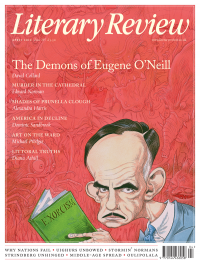Andrew Hussey
Oulipotastic
Many Subtle Channels: In Praise of Potential Literature
By Daniel Levin Becker
Harvard University Press 322pp £19.95
On the face of it, there is a great deal in this book to baffle even the most open-minded of English-speaking readers. It is essentially an account of the life and times of the Oulipo group, a Paris-based coalition of writers, mathematicians and artists that was set up in 1960 with the express intention of making life difficult for its members and readers. The clue to the real nature of the group is in the acronym ‘Oulipo’ – which, when unpacked, stands for Ouvroir de la littérature potentielle, or Workshop for Potential Literature. This is meant to describe the practice of Oulipo members, who deliberately set themselves constraints on their writing. These can include palindromes, lipograms (excluding one or more letters), the snowball (a poem in which the first line is a single word, the second two words, and so on) and other myriad forms of self-imposed difficulty. The big idea is that if you set off to write, let’s say, a short story by deliberately forcing yourself to replace every seventh noun in the text with the seventh noun after it in the dictionary then you are bound to end up somewhere unexpected. Hence the term ‘potential literature’. From this point of view, it is hard to avoid the suspicion that this is no more than a particularly mirthless form of linguistic trickiness for its own sake; a kind of highbrow Gallic version of Scrabble or indeed the quiz show Countdown.
This book admirably demonstrates that this is not the case. Daniel Levin Becker was a student of French literature at Yale when he encountered the works of the Oulipo in the course of a standard review of twentieth-century French literature. He describes his first reaction as fascination, intrigue and then,

Sign Up to our newsletter
Receive free articles, highlights from the archive, news, details of prizes, and much more.@Lit_Review
Follow Literary Review on Twitter
Twitter Feed
Under its longest-serving editor, Graydon Carter, Vanity Fair was that rare thing – a New York society magazine that published serious journalism.
@PeterPeteryork looks at what Carter got right.
Peter York - Deluxe Editions
Peter York: Deluxe Editions - When the Going Was Good: An Editor’s Adventures During the Last Golden Age of Magazines by Graydon Carter
literaryreview.co.uk
Henry James returned to America in 1904 with three objectives: to see his brother William, to deliver a series of lectures on Balzac, and to gather material for a pair of books about modern America.
Peter Rose follows James out west.
Peter Rose - The Restless Analyst
Peter Rose: The Restless Analyst - Henry James Comes Home: Rediscovering America in the Gilded Age by Peter Brooks...
literaryreview.co.uk
Vladimir Putin served his apprenticeship in the KGB toward the end of the Cold War, a period during which Western societies were infiltrated by so-called 'illegals'.
Piers Brendon examines how the culture of Soviet spycraft shaped his thinking.
Piers Brendon - Tinker, Tailor, Sleeper, Troll
Piers Brendon: Tinker, Tailor, Sleeper, Troll - The Illegals: Russia’s Most Audacious Spies and the Plot to Infiltrate the West by Shaun Walker
literaryreview.co.uk